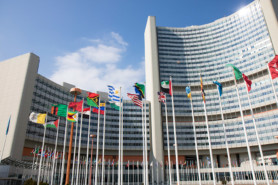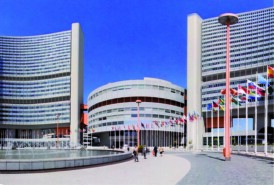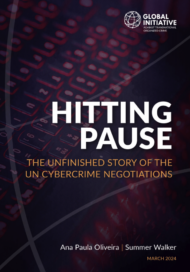Posted on 05 Jun 2024
The UN Commission on Crime Prevention and Criminal Justice (CCPCJ) held its 33rd session from 13 to 17 May. This came in the wake of a highly significant vote on harm reduction at the 67th UN Commission on Narcotic Drugs (CND) in March, which broke with the usual practice of consensus embodied in the so-called ‘Vienna spirit’. Although some fiery statements on political issues were exchanged during the CCPCJ plenary, delegations did not call for votes when negotiating the outcomes of the meeting. The session concluded with all resolutions being adopted by consensus, resulting in a meeting that was less heated than previous multilateral gatherings.
The theme of this year’s CCPCJ was ‘promoting international cooperation and technical assistance’. However, the resolutions tabled were limited to a small range of issues, with little focus on the overarching theme.
Road to Abu Dhabi 2026
A resolution tabled by the chair of the meeting (the ambassador of the Czech Republic), Japan and the United Arab Emirates (UAE) focused on the follow-up to the 14th UN Congress on Crime Prevention and Criminal Justice (hosted by Japan in 2021) and preparations for the 15th Congress (to be held in Abu Dhabi in April 2026). This resolution sets out the modalities to begin preparations for the upcoming congress and invites states to negotiate its political declaration ahead of the meeting, following the approach taken in Kyoto in 2021 and Qatar in 2015. However, although this approach is attractive to state delegates, it limits opportunities for civil society to contribute and reinforces the state-centric direction the Congress is taking, which runs counter to its mandate.
The countdown to the Abu Dhabi congress has begun, its theme being ‘protecting people and planet’. Given the current state of geopolitics, the hosts have set themselves a tough challenge to emerge from the congress with meaningful, consensus-based outcomes to address overarching global threats.
In a foretaste of the kind of political debate the congress might generate, Sudan argued it is controversial for the UAE to host the meeting, accusing it of being a major supplier of arms and support to the Rapid Support Forces rebels in Sudan. The UAE’s role as a hub for illicit financial flows and a haven for organized criminals seeking to evade justice could also make for uncomfortable discussions. The Global Initiative Against Transnational Organized Crime will monitor and engage in the preparations and proceedings of the congress, as we did at the Kyoto Congress.
Other resolutions
A resolution on rehabilitation and reintegration of offenders, tabled by Colombia, Japan, South Africa, Thailand and Vietnam, was adopted. This sought to continue the work of an expert group aimed at developing model strategies to reduce recidivism.
While consensus was quickly reached on this resolution, negotiations on the remaining three resolutions took most of the week. Belarus (supported by Nicaragua and Syria) tabled a resolution on trafficking in persons, while Australia and Indonesia led negotiations on a resolution on the treatment of children associated with terrorist groups, which was supported by Austria, Bulgaria, Croatia, the Dominican Republic, France, Germany, Italy, Malta, Morocco, the Philippines, Romania and Slovenia. On a related issue, Italy introduced a resolution on preventing and countering violence against children by organized criminal groups and terrorist groups, which was supported by Andorra, Austria, Ecuador, France, Germany, Indonesia, Italy, Malta and Slovenia.
The Belarusian resolution faced initial political resistance. It was tabled shortly after Belarus had been voted off the 40-member CCPCJ earlier this year (to take effect at the end of this year). Many countries rejected Belarus’s credibility as author of the resolution, given its role in the Russia–Ukraine conflict and in the alleged trafficking of Ukrainian children, which has been the subject of an International Criminal Court case against Russia. Surprisingly, however, Western countries quickly moved on from these issues to discuss the substance of the resolution (last year, they refused to engage at all for part of the week, as the resolution’s negotiations were chaired by Belarus), which focused on addressing trafficking that takes place online.
Here, states were divided primarily over the terminology – in line with the positions they adopted during the UN cybercrime treaty negotiations. Ultimately, the Russian/Belarusian terminology of ‘criminal misuse of ICTs’ was not included in favour of the more general references to ‘online trafficking’ favoured by Western countries. As in last year’s negotiations, the use of the term ‘survivors’ of trafficking was also contentious, with the US and others pushing for its inclusion and Russia leading the calls to reject the term.
The Indonesian/Australian resolution on the treatment of children associated with terrorist groups elicited a lack of agreement on the meaning of ‘associated with terrorist groups’. It was agreed to include wording in a footnote that leaves it up to member states to apply the meaning in accordance with their domestic law. There were also debates about how to refer to different parts of the UN architecture and what exactly constitutes an ‘armed conflict’ – a sensitive issue in the current political climate. The resolution’s main outcome is a planned expert group to explore best practices and develop guidelines on these issues.
The Italian resolution on preventing violence against children became the target of ultimately unsuccesful Iranian efforts to insert language complaining about Western sanctions. This had the unfortunate effect of distracting delegates from the substantive issues, but in the end no direct reference to sanctions or ‘unilateral coercive measures’ was included. However, the resolution still required extensive discussion on whether to use the term ‘children’s priorities’, favoured by Iran, but in the end the resolution retained references to ‘children’s needs’, preferred by other countries. Consensus on all resolutions was reached on the last day of the congress.
What next?
Although the negotiations went relatively smoothly, there were heated exchanges in the plenary, with Russia raising logistical and procedural complaints on a range of issues, from the Ukraine conflict to the lack of intepreters and the mandate of the EU in the CCPCJ. These exchanges did not impede the progress of the resolutions or lead to lengthy discussions, but served as a reminder of the fractious political context in which this CCPCJ took place.
The focus now turns to the upcoming congress in Abu Dhabi, for which regional preparatory meetings will be held in early 2025, to be followed by the start of a negotiation process for its declaration. Before that, states party to the UN Convention against Transnational Organized Crime (UNTOC) will hold their 12th Conference of Parties in Vienna in October. In the absence of data from the convention’s review mechanism, states are expected to advance discussions on some of the issues addressed at the CCPCJ, with environmental crimes likely to be a focus for resolutions.
More imminently, the Ad Hoc Committee on cybercrime will hold its reconvened concluding session from 29 July to 9 August in New York. Whether this brings more stalemate and delays, a revival of multilateral consensus, or another vote that polarizes positions, the outcome of this meeting will set the tone for the future work of the CCPCJ and the UNTOC Conference of Parties.
The 33rd session of the CCPCJ felt calmer than previous multilateral meetings, but given the current state of geopolitics, it would be naive not to expect more division and polarization as the international community looks ahead to its upcoming agenda on organized crime.
JOIN THE GI-TOC UN ENGAGEMENT MAILING LIST
The GI-TOC’s engagement at the UN on transnational organized crime has always been a key pillar of our work, and we are committed to contributing substantively to key debates involving organized crime in the multilateral forums, coordinating civil society support and expert engagement. Join our dedicated mailing list that will be used to share updates, event information, analysis, and multimedia content.



